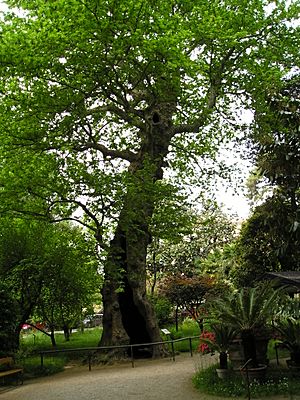Ombra mai fu facts for kids
Ombra mai fu is a famous song from the 1738 opera Serse by George Frideric Handel. It's also known as "Largo from Xerxes" or simply "Handel's Largo". An aria is a song for one voice, usually in an opera.
Contents
About the Song
When Handel's opera Serse first came out in London, it wasn't very popular. It only played five times! However, in the 1800s, people rediscovered "Ombra mai fu" and it became one of Handel's most loved pieces.
Handel didn't create the song completely from scratch. He adapted it from a version by Giovanni Bononcini. Bononcini, in turn, had adapted it from an even older version by Francesco Cavalli. All three composers used the same story, or libretto, written by Nicolò Minato.
The Music of "Ombra mai fu"
Originally, this song was written for a male soprano voice. Today, it's often sung by different types of singers, like a countertenor (a male singer with a high voice), a contralto or mezzo-soprano (female singers with lower voices), or sometimes even a tenor or baritone (male singers).
The song has also been changed to be played by many different instruments. You can hear it played on a solo organ, a piano, or by a violin or cello with a piano. Sometimes, groups of string instruments play it too. Even though it's often called "Largo," which means "slow," the original music marking is larghetto, which means "a little bit slow."
In the opera, before the song starts, there's a short musical part called a recitativo accompagnato. This part sets the scene for the song. The song itself is quite short, usually lasting about three to four minutes.
The music is played by a string section, which includes first and second violins, violas, and basses. The song is in the key of F major and has a time signature of 3/4 time.
The Story Behind the Song
The title "Ombra mai fu" means "Never was a shade" in Italian. The song is sung by the main character of the opera, Xerxes I, who was a real king of Persia. In the opera, he sings this song while admiring the beautiful shade of a plane tree.
Here are the words of the song in Italian and English:
Frondi tenere e belle
del mio platano amato
per voi risplenda il fato.
Tuoni, lampi, e procelle
non v'oltraggino mai la cara pace,
né giunga a profanarvi austro rapace.
Ombra mai fu
di vegetabile,
cara ed amabile,
soave più.
Tender and beautiful fronds
of my beloved plane tree,
let Fate smile upon you.
May thunder, lightning, and storms
never disturb your dear peace,
nor may you by blowing winds be profaned.
Never was a shade
of any plant
dearer and more lovely,
or more sweet.
Because this song is so popular, it's often sung outside of the opera. People have also created new words for the music, both for everyday use and for religious songs.
"Ombra mai fu" in Media
This famous song has appeared in many different types of media:
- On December 24, 1906, Reginald Fessenden, a Canadian inventor, made the first AM radio broadcast. It started with a recording of "Ombra mai fu."
- In the 1983 Japanese film The Makioka Sisters, an electronic version of the song is heard during a cherry blossom viewing scene.
- The song is also used in the 1988 film Dangerous Liaisons during a private concert scene.
- In the 1995 BBC TV show Pride and Prejudice, the character Mary Bennet sings the song (with English words) at a ball.
- The song plays an important part in the 2017 film A Fantastic Woman. The main character, Marina, who is a transgender woman and a singer, performs the song near the end of the movie.
- The song is played during the ending credits of the 2023 film The Tutor.
See also
 In Spanish: Ombra mai fu para niños
In Spanish: Ombra mai fu para niños
 | John T. Biggers |
 | Thomas Blackshear |
 | Mark Bradford |
 | Beverly Buchanan |


